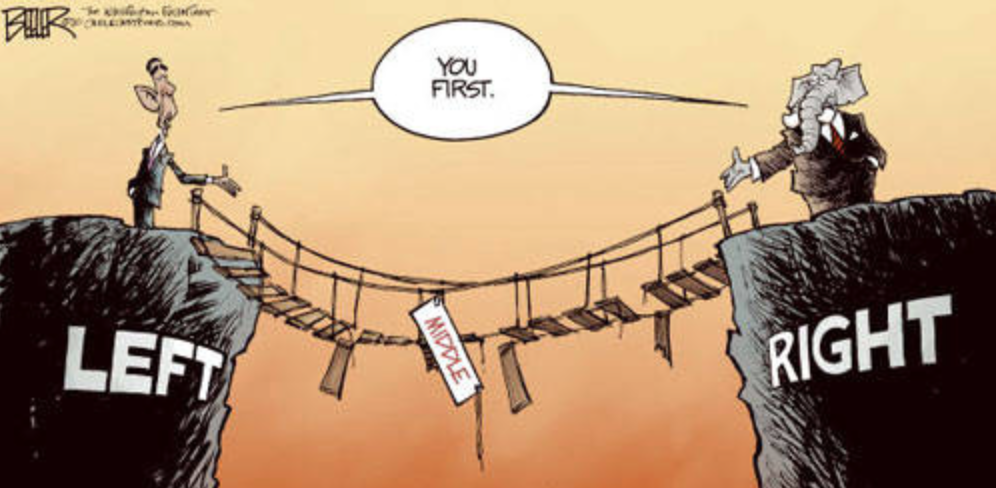“What is it you object to?” asked Syme. “You want to abolish Government?”
“To abolish God!” said Gregory, opening the eyes of a fanatic. “The silly sentimentalists of the French Revolution talked of the Rights of Man! We hate Rights and we hate Wrongs. We have abolished Right and Wrong.”
“And Right and Left,” said Syme with a simple eagerness. “I hope you will abolish them too. They are much more troublesome to me.”
This exchange in G. K. Chesterton’s novel, The Man Who was Thursday, between the anarchist Lucien Gregory and the Catholic, Gabriel Syme, raises some very interesting questions of continuing and contemporary relevance. Whereas radical relativists and nihilists, such as Gregory, want to abolish all conventional notions of right and wrong, most people are, or at least should be, much more troubled by the division of politics into right and left.
Regardless of whether a nihilist can be entirely comfortable with the abolition of moral conventions, a prudent person cannot be entirely comfortable with supporting those on either the so-called Right or the so-called Left. On the Right we have the necessity of a big and burgeoning government to support neo-conservative militarism and imperialism, and to support the subsidizing of large corporations, such as those in the pharmaceutical industry, through the levying of taxes. On the Left we have the necessity of big and burgeoning government to support a welfare state in which an increasing proportion of the population are in a state of dependency on the Federal government for jobs or welfare. In both cases government gets bigger and more powerful, while the democratic power wielded by ordinary people is eroded and destroyed.
As for rights and wrongs, the debate over what is right and who has rights continues to confuse political debate and discourse. Take, for instance, the abortion debate. Everyone, in the abstract, is both pro-choice and pro-life. It is good to have freedom of choice and it is obviously good to support life. The problem arises when one claims the right to choose to take a life. Do we have the right to choose to kill another person? Paradoxically, at least in one sense, we do have such a right, and not merely in the case of self-defense or in a just war. One of the primal characteristics of humanity is that we have free will. We are not slaves to instinct. We are born with the right to choose! We are free to choose the good or to choose the evil. We have freedom of choice and, in this sense, we can choose to kill ourselves or another.
The issue is not whether we have such a right but whether the right comes with certain inalienable responsibilities associated with it. In other words, we have the right to choose to kill but the responsibility to refrain from doing so. Should we choose to exercise our free will by murdering our brother or stealing from him, thereby ignoring our responsibility to refrain from doing so, we should expect to suffer the consequences, in law, of such a malicious choice. In other words, some rights are exercised at our peril!
Paradoxically, although we have a right to choose, we don’t have a right to life. Life is not a right. If it were, none of us would suffer its being taken from us. Life is a gift. It is given to us. It will also be taken from us. We might be free to choose when we die but not if we die. The issue is not whether we have the right to life; the issue is whether we have an absolute responsibility to refrain from the evil choice of taking the life of another human person, inside the womb or out of it. In this sense rights can be wrong when exercised for evil purposes.
So much for rights and wrongs.
As for right and left, perhaps we should simply echo the words of Mercutio in Romeo and Juliet and call down a plague on both their houses!
















Leave a Comment
Your email address will not be published. Required fields are marked with *